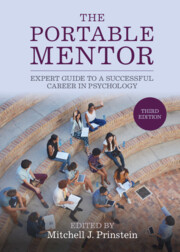Book contents
- The Portable Mentor
- The Portable Mentor
- Copyright page
- Dedication
- Contents
- Figures
- Tables
- Boxes
- Contributors
- Preface
- Acknowledgments
- Part I Applying to Graduate School
- Part II Beginning your Career
- Part III Your Research/Academic Career
- Part IV Your Career as a Practitioner
- Part V Your Professional Service Career
- Part VI Your Career After Graduate School
- Index
- References
Part II - Beginning your Career
Published online by Cambridge University Press: 21 July 2022
- The Portable Mentor
- The Portable Mentor
- Copyright page
- Dedication
- Contents
- Figures
- Tables
- Boxes
- Contributors
- Preface
- Acknowledgments
- Part I Applying to Graduate School
- Part II Beginning your Career
- Part III Your Research/Academic Career
- Part IV Your Career as a Practitioner
- Part V Your Professional Service Career
- Part VI Your Career After Graduate School
- Index
- References
Summary

- Type
- Chapter
- Information
- The Portable MentorExpert Guide to a Successful Career in Psychology, pp. 71 - 194Publisher: Cambridge University PressPrint publication year: 2022



